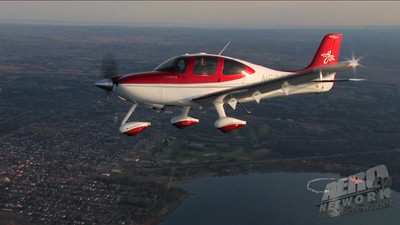Actor/Pilot Harrison Ford Will Speak To The Masses About
Importance Of GA
 Obviously noting the
excellent visibility Pilot/Actor Harrison Ford has brought to the
EAA's Young Eagles program and Cessna's amazing Special Olympics
airlift, AOPA has brought in some Hollywood muscle to make GA more
publicly visible and acceptable to the public at large.
Obviously noting the
excellent visibility Pilot/Actor Harrison Ford has brought to the
EAA's Young Eagles program and Cessna's amazing Special Olympics
airlift, AOPA has brought in some Hollywood muscle to make GA more
publicly visible and acceptable to the public at large.
General aviation is an economic engine that pumps $150 billion
into the United States economy each year. In local communities, it
brings outside business in, and lets local businesses extend their
reach. It provides more than a million jobs nationwide. It also
provides services to all Americans through law enforcement,
medevac, and other emergency services operations, as well as aiding
relief efforts in times of disaster.
Of course, those facts aren't news to most pilots, or ANN
readers... but outside the industry, it's a message that still
falls on deaf ears.
GA faces acute challenges from several directions which could
cause much, if not all, of that economic activity to dry up. Hoping
to prevent that from happening, the Aircraft Owners and Pilots
Association launched Monday one of the largest campaigns in the
70-year history of the pilot advocacy group: General Aviation
Serves America.
"At the heart of many of those challenges is a general lack of
understanding about the role general aviation plays every day in
the nation’s transportation system, in our communities and in
our economy," said AOPA President and CEO Craig L. Fuller. "We are
fortunate to have someone as well known as actor and avid pilot
Harrison Ford volunteer his services to help explain all that GA is
and does."
Joining Ford will be real people telling real stories about what
general aviation means to their communities and to their
businesses. Examples include the mayor of a Midwestern town whose
major employer came to town because of the easy access afforded by
the community airport... or the doctor who can only get to his
island resident patients by air.

AOPA says the campaign comes at a critical time, as general
aviation is under tremendous pressure from legislators and
regulators. The Obama administration wants to change the way the
FAA is funded and raise $7.5 billion through direct user charges
starting in October 2011. At the same time, onerous and
ill-conceived security regulations are threatening to strangle
GA.
Proposed reductions in the General Fund contribution to the FAA
could weaken support for community airports -- a support already
undermined by urban sprawl, with some local governments seeking to
replace airports with residential development. Adding to GA's
burdens is an increasingly negative and unfair public perception of
general aviation as "jets for the rich."
 "I won't beat around
the bush," said Fuller. "The current challenges facing general
aviation are formidable."
"I won't beat around
the bush," said Fuller. "The current challenges facing general
aviation are formidable."
AOPA has committed an initial $1.5 million to the campaign, with
plans to spend several million dollars more in the next few years.
To inform the public of GA's crucial role in our lives, the
campaign will employ digital advertising, web and viral resources
and electronic grassroots outreach. In addition, AOPA is planning
extensive paid radio, television and print advertising, both
nationally and in targeted states.
While AOPA's campaign will tell that story through the
experiences of ordinary people, there is also the story told by
hard statistics: general aviation creates jobs. Some 1.2 million
people work at general aviation companies that generate more than
$150 billion in economic activity each year. Especially at this
time of severe economic troubles, it makes no sense to harm a
sector that's vital to our economy.
"General aviation provides an economic lifeline for communities
across America," says Ford, who is also a long-time AOPA member.
"Millions of jobs and businesses of all sizes depend on small
aircraft serving our country every day. Yet a federal proposal for
costly new fees could shut down community airports nationwide."
"One broken link in the fragile general aviation chain could
collapse the entire general aviation system across the country,"
Fuller concluded. "That's how imperative the actions we take today
are to the future of general aviation."
 Aero-News: Quote of the Day (04.28.25)
Aero-News: Quote of the Day (04.28.25) ANN's Daily Aero-Term (04.28.25): Decision Altitude (DA)
ANN's Daily Aero-Term (04.28.25): Decision Altitude (DA) ANN's Daily Aero-Linx (04.28.25)
ANN's Daily Aero-Linx (04.28.25) Airborne-Flight Training 04.24.25: GA Refocused, Seminole/Epic, WestJet v TFWP
Airborne-Flight Training 04.24.25: GA Refocused, Seminole/Epic, WestJet v TFWP Aero-News: Quote of the Day (04.29.25)
Aero-News: Quote of the Day (04.29.25)





